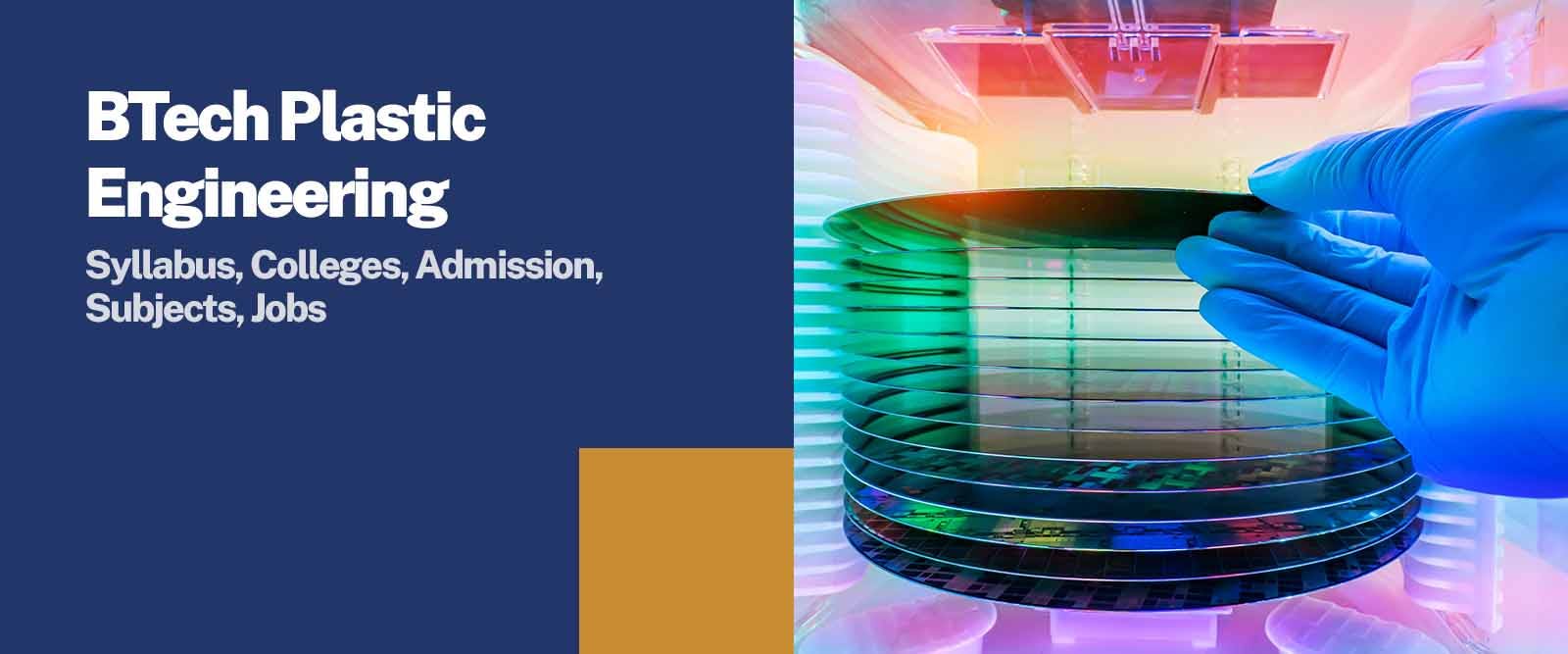5800 students unlocked their dream jobs with UG/PG programs in top colleges. Apply Now!
Plastic engineering is a branch of engineering that teaches how to design and produce plastic material. The pursuant of plastic engineering courses study the properties of different types of plastic and determine their quality.
Are you looking to pursue a career in plastic engineering but not sure about how and where to start? Don't worry; by the end of this blog, all your doubts regarding the B.Tech program in Plastic engineering will get cleared.
In the following post, we will discuss the bachelor of technology in plastic engineering syllabus, the admission process to colleges that offer the course, and other information.
[Also read: Why choose B.Tech?]
A Quick Intro to B.Tech Plastic Engineering Course Details
|
Course Level |
Undergraduate (UG) Degree Program |
|
Full Form |
Bachelor of Technology in Plastic Engineering |
|
Duration |
4 Years |
|
Age |
No age limit |
|
Minimum Percentage |
Having a minimum average mark of 50% in 12th Grade |
|
Average Course Fees |
₹ 25,000 to 2 Lakhs |
|
Average Salary |
₹1 Lakhs to ₹6 Lakhs (annually) |
|
Employment Roles |
Plastic Engineer, Quality Control Engineer, Plastic Design Engineer, Product Developer, Plastic Design Specialist, Plant Supervisor, Process Engineer, Production Supervisor, etc. |
What is Plastic engineering?
Plastic engineering involves the study of the properties and behaviour of plastics, as well as using various processes such as injection moulding, blow moulding, and extrusion for manufacturing products made of plastic. Plastic engineers work to develop new types of plastic materials and techniques, improve existing products and processes, and find new and innovative uses for plastic materials.
Plastic engineers play a critical role in various industries, including consumer goods, packaging, automotive, and construction.
Scope for B.Tech in Plastic Engineering
A B.Tech in Plastic Engineering provides a comprehensive education in plastic product design, manufacturing, and processing. Here are a few reasons why you may choose to do B.Tech in this field:
- High Demand: The use of plastic products has increased significantly in recent years and is expected to continue growing, leading to high demand for plastic engineers.
- Diverse Career Opportunities: Plastic engineers are employed in various industries, including automotive, consumer goods, packaging, construction, and more.
- Hands-On Experience: The course curriculum often includes laboratory work and practical projects that allow students to apply what they have learned to real-world scenarios.
- Interdisciplinary Field: Plastic engineering draws on knowledge from several disciplines, including chemistry, physics, and materials science, making it a well-rounded field of study.
- High Earning Potential: Plastic engineers often enjoy competitive salaries, making it a lucrative career choice.
Plastic Engineering Course: Syllabus
The syllabus of the B.Tech program covers crucial topics such as chemistry, maths, polymer structure, thermodynamics, etc. The following is the complete syllabus for a student's B.Tech degree program, which is divided into semesters:
|
First Year Syllabus for B.Tech Plastic Engineering |
|
|
Semester I |
Semester II |
|
Mechanics |
Chemistry |
|
Applied physics |
Mathematics II |
|
Engineering drawing |
Data structures |
|
English |
Thermodynamics |
|
Mathematics I |
Basic electronics |
|
Basics of electrical engineering |
Engineering workshop |
|
Programming in C |
Business communication |
|
Second Year Syllabus for B.Tech Plastic Engineering |
|
|
Semester III |
Semester IV |
|
Material sciences |
Polymer structure |
|
Polymer chemistry |
Applied mathematics |
|
Strength of material |
Organisational behaviour |
|
Engineering economics |
Additives and compounding |
|
Polymer Chemistry lab |
Plastic materials and applications |
|
Fluid mechanics and machines |
Fundamental of chemical Engineering |
|
Physics chemistry of polymers |
Polymer structure and properties relationship lab |
|
Third Year Syllabus for B.Tech Plastic Engineering |
|
|
Semester V |
Semester VI |
|
Elective subject |
Rubber science |
|
Fibre technology |
Electric subject |
|
Plastic testing technique |
Moulding engineering |
|
Plastic waste management |
Material engineering |
|
Plastic packaging technology |
Polymer reaction engineering |
|
Plastic processing technology |
Environmental science and engineering |
|
Machining Science and technology |
Advanced plastic processing techniques |
|
Fourth Year Syllabus for B.Tech Plastic Engineering |
|
|
Semester VII |
Semester VIII |
|
Nano science |
Research project |
|
Heat transfer |
Industrial training |
|
Biotechnology |
Latex and form technology |
|
Polymer Rheology |
Biodegradable polymers |
|
Polymer composite technology |
Statical quality control techniques |
|
Production and operation management |
Industrial safety and hazard management |
Top Indian Colleges Providing B.Tech Programs in Plastic Engineering
Have you made up your mind to pursue a B.Tech program in plastic engineering? Studying at a top-tier university can help you land the best job after graduation. To help you, we've compiled a list of colleges that offer a B.Tech in Plastic Engineering and the top engineering entrance exams they accept.
|
Name of the Institute |
Entrance Exam Accepted |
Average Course Fee |
Average Salary |
|
Aryabhatta Knowledge University |
JEE Mains/ SMAT/ BCECE |
₹25,000 |
₹6,50,000 |
|
Gujarat Technological University |
JEE Main |
₹75,000 |
₹4,50,000 |
|
Central Institutes of Plastic Engineering and Technology (CIPET), Lucknow |
UPCET |
₹40,000 |
₹5,20,000 |
|
Harcourt Butler Technical University, Kanpur |
JEE Main + UPCE Exam |
₹1,35,000 |
₹6,00,000 |
|
CIPET Chennai |
CIPET JEE Exam |
₹1,17,000 |
₹6,00,000 |
How to Get Admission in B.Tech Degree Programs?
In India, most of the top-level public universities admit students with the highest rank in the most popular engineering entrance exams like JEE Main and JEE Advanced. While private institutions conduct their own entrance exams to admit students to B.Tech programs.
Here are the steps that you need to follow to get admission to your desired university:
- Register yourself for the entrance exam by creating an account with the basic details of yourself.
- Complete the application form with all the necessary information. Make sure to put all the details correctly and accurately.
- Upload the necessary documents such as photographs, 10th and 12th mark sheets, and your signature using a scanner. The document's requirements may vary from institute to institute.
- After a few days of application, the admit card will get released for the eligible students. Make sure to download your admit card and grab a printout for the copy to be used during the examination day.
- Once the admit card gets released, the portal will also reveal the date of examination. Prepare for the entrance exam using the past paper and the mentioned syllabus.
- After a couple of weeks of the examination, the result will be announced. All the qualified candidates can move to the next round, i.e., counselling and admission.
- If you pass your entrance exam, you will be eligible to enrol in the B.Tech in Plastic Engineering.
Conclusion
A B.Tech in plastic engineering offers diverse career opportunities in various industries such as automotive, packaging, construction, consumer goods, and more. But if you want to expand your boundaries of skills and opportunities, register with Sunstone. Sunstone, being a leading higher education service provider with a pan-India presence, offers top-quality career enhancement courses with placement assistance.
FAQ - Plastic Engineering
What can I do after B.Tech in Plastic Engineering?
After finishing your B.Tech course in plastic engineering, you can apply for different job roles. Moreover, if you wish to pursue further education, you can do so in the form of a Master's degree or a PhD in plastic engineering.
HELP
Take the first step towards your dream job.
ABOUT THE AUTHOR


